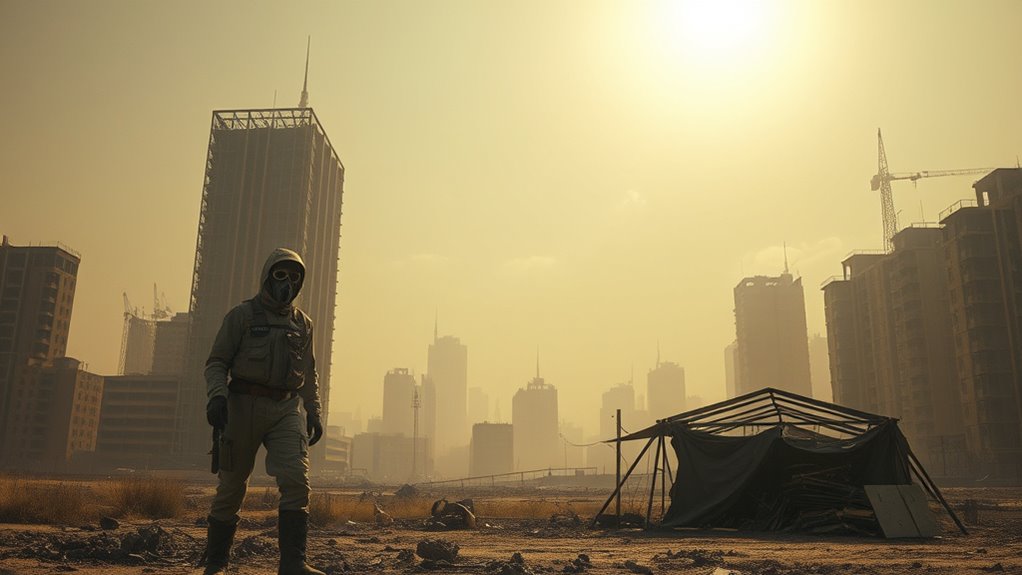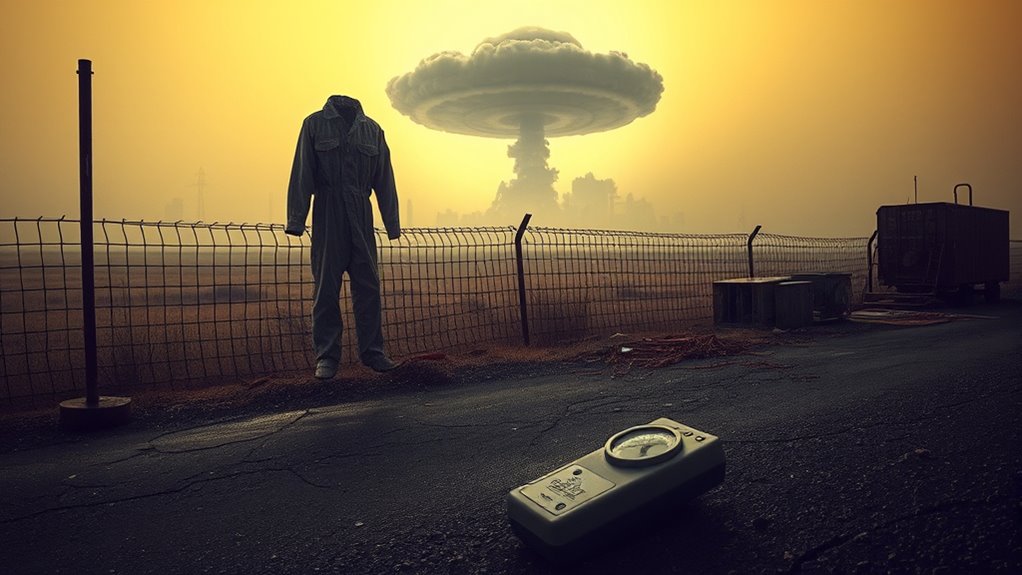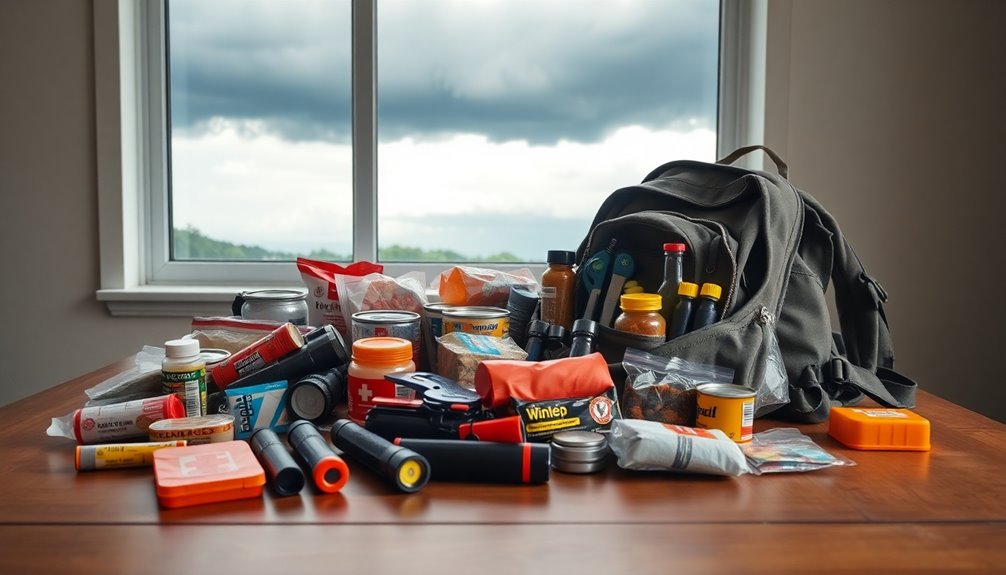In a nuclear or radiation emergency, your first step is to seek shelter immediately in a sturdy, dense material building, away from windows and outside walls. Seal windows and doors with plastic sheeting and duct tape to prevent contamination. Stay inside and turn off ventilation systems. Keep emergency supplies like water, food, and a radio nearby, and listen to official updates. Knowing how to protect yourself now can make a vital difference—explore further to learn detailed strategies.
Key Takeaways
- Seek immediate shelter indoors, away from windows and exterior walls, to reduce radiation exposure.
- Seal windows and doors with plastic sheeting and duct tape to prevent contaminated air from entering.
- Stock emergency supplies like water, non-perishable food, flashlight, batteries, and a battery-powered radio.
- Follow official instructions for evacuation or shelter-in-place, and use designated safe routes if evacuating.
- Stay informed via trusted communication channels and monitor radiation levels to adapt safety measures accordingly.

Nuclear and radiation emergencies can happen unexpectedly, but knowing how to respond quickly can considerably improve your chances of staying safe. The first step in your emergency preparedness plan involves understanding the importance of radiation shielding. Radiation shielding refers to materials or objects that can block or reduce the amount of harmful radiation reaching you. When a nuclear incident occurs, your goal is to minimize exposure as much as possible. Thick walls, concrete barriers, or even heavy furniture can serve as effective shields against radiation. If you’re indoors, stay inside and move away from windows and exterior walls, as these are more vulnerable to radiation penetration. Covering windows with heavy blankets or plastic sheeting can further reduce radiation entry. If you’re outside, find a sturdy building immediately, ideally one made of dense materials, and go inside without delay.
Emergency preparedness involves having a well-stocked kit and a clear plan of action. Your emergency kit should contain essentials like bottled water, non-perishable food, a flashlight, batteries, a radio, and basic first aid supplies. Keep a supply of potassium iodide tablets if advised by authorities, as they can help protect your thyroid from radioactive iodine. Also, prepare an evacuation plan, knowing the safest routes to local shelters or designated safe zones. When a radiation emergency occurs, listen to official updates through a battery-powered radio or emergency alert system. Authorities might issue instructions to shelter in place or evacuate, depending on the severity and nature of the incident. Understanding the importance of financial preparedness can help you manage unexpected costs related to emergency response and recovery.
If you’re instructed to shelter in place, your priority is to stay indoors and create a barrier against radiation. Seal windows and doors with duct tape and plastic sheeting to prevent contaminated air from entering. Turn off ventilation systems that draw in outside air. Stay in a central room, preferably one with as few windows as possible, and limit your movement. If evacuation becomes necessary, follow the routes specified by authorities and take your emergency kit with you. Remember, time is critical—move swiftly but calmly, and avoid unnecessary exposure. Throughout the ordeal, continuously monitor official communication channels for updates and instructions.
Frequently Asked Questions
How Can I Detect Radiation Levels at Home?
You can detect radiation levels at home by using DIY detectors or radiation badges. DIY detectors, like simple homemade Geiger counters, help you identify increased radiation, while radiation badges can monitor exposure over time. Regularly check your badges and compare readings to safety standards. Keep in mind, for accurate detection, investing in a professionally calibrated device is best, but these tools give you a useful starting point for monitoring radiation in your environment.
What Are the Long-Term Health Effects of Radiation Exposure?
About 20% of radiation exposure cases lead to chronic health issues, including increased cancer risks. Long-term effects can include genetic mutations passed to future generations and chronic health problems like radiation sickness or organ damage. You might not notice symptoms immediately, but ongoing exposure raises your risk of serious health issues later. Staying informed and minimizing exposure are your best defenses against these long-term health effects.
How Do I Establish a Safe Water Supply After a Nuclear Incident?
You should first identify potential contamination sources, such as nearby nuclear plants or debris. To establish a safe water supply, use water purification methods like boiling, filtering, or chemical treatments to remove radiation and contaminants. Always test water if possible, and avoid collecting from uncertain sources. Regularly purify water before consumption to guarantee it’s safe, and stay informed about local radiation levels and safety advisories.
Can Pets and Livestock Be Safely Protected During Radiation Emergencies?
Pet safety and livestock protection are vital during radiation emergencies. You should move your pets and livestock to a sheltered, clean area away from fallout or contaminated zones. Cover animals with blankets or tarps to reduce exposure, and provide fresh, uncontaminated water and food. Avoid letting them wander outside, and monitor their health closely. Proper planning and quick action help guarantee their safety during radiation threats.
What Are the Psychological Impacts of Surviving a Nuclear Event?
After a nuclear event, you might experience psychological trauma, such as anxiety, depression, or flashbacks. These mental health impacts are common and can be overwhelming. It’s essential to seek mental health support early, whether through professional counseling or support groups. Taking care of your emotional well-being helps you cope better with the aftermath and gradually rebuild your resilience and sense of safety.
Conclusion
In a nuclear or radiation emergency, stay calm, follow the plan, and don’t forget your emergency kit—think of it as your personal TARDIS, ready to transport you to safety. Remember, every second counts, so act quickly and wisely. Keep your head and trust your preparation. Just like in those classic sci-fi flicks, your swift action can make all the difference. Stay alert, stay safe, and you’ll come through stronger—like a hero from the future.










